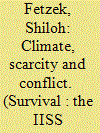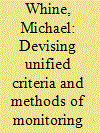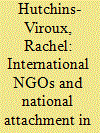| Srl | Item |
| 1 |
ID:
138603


|
|
|
|
|
| Summary/Abstract |
Soon after he took office in 2007, United Nations Secretary-General Ban Ki-moon declared that there was an urgent need to reframe the debate on climate change from an environmental to a development and security issue, and that it would be one of his top priorities as UN leader.
Environmental factors, including land use, water availability, biodiversity loss, soil degradation and acute weather events, have been implicated in at least 73 conflicts since 1980, and at least 40% of intra-state conflicts since the end of the Second World War can be associated with natural resources. A rapidly growing body of research on climate change, resource scarcity and conflict has ensured that the issue is rising on the international agenda. Yet, although such concerns cut across the security, development and humanitarian sectors, there is little dialogue, let alone coordination, between and among government departments and international and non-governmental organisations responsible for these domains.
|
|
|
|
|
|
|
|
|
|
|
|
|
|
|
|
| 2 |
ID:
089009


|
|
|
| 3 |
ID:
096837


|
|
|
|
|
| Publication |
2010.
|
| Summary/Abstract |
This article evaluates the evolution of Americans' sense of solidarity, community, and identity in the age of globalisation through an examination of their involvement with non-governmental organisations (NGOs) and social movements active in the developing world. This analysis draws on Jürgen Habermas' contention that, in this age of an increasingly global and inequitable economy, civil society organisations that extend beyond national borders are more likely than other institutions to engender transnational solidarity. The article focuses primarily on results of an opinion survey conducted by the author, examining to what extent U.S. volunteers for international NGOs exhibit national or transnational senses of belonging. Conclusions include the ideas that this cosmopolitan population may indicate an emerging trend in greater feelings of solidarity with and attachment to developing countries, leading to increased support for more multilateral decision-making. However, this more global consciousness seems unlikely to replace feelings of national attachment and belonging.
|
|
|
|
|
|
|
|
|
|
|
|
|
|
|
|